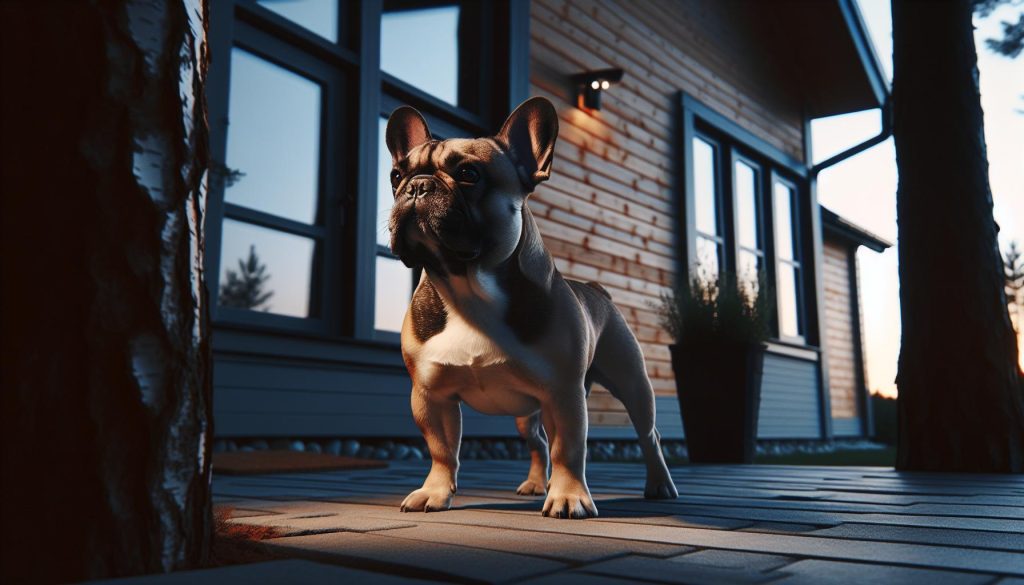About
Can French Bulldogs Be Guard Dogs?
Page Contents
French Bulldogs, with their charming bat-like ears and affectionate nature, have captured the hearts of many dog lovers worldwide. Known for their playful and sociable demeanor, they are frequently enough seen as the quintessential companion animal.However, when it comes to the role of a guard dog, questions arise about their suitability. Can these small, muscular dogs with a big personality effectively protect their homes and families? this article explores the potential of French Bulldogs to serve as guard dogs, examining their temperament, instincts, and capabilities, and whether their endearing quirks can translate into vigilant guardianship.
Understanding French Bulldog Temperament
French Bulldogs are known for their affectionate and sociable nature, which makes them excellent companions but not ideal candidates for guard dog duties. These charming canines thrive in environments where they can interact closely with their human families, often forming strong bonds that are characterized by loyalty and affection. Despite their sometimes stubborn streak, French Bulldogs are generally eager to please, which makes them highly trainable for basic obedience.
While their playful and friendly demeanor is a delight, it doesn’t lend itself well to the protective instincts typically associated with guard dogs. French Bulldogs are more likely to greet strangers with curiosity rather than suspicion. Though, they do possess a few traits that can be beneficial in a watchdog role. As an example, they are naturally alert and will frequently enough bark to alert their owners of unfamiliar noises or visitors. This can provide a basic level of security, albeit without the intimidation factor that larger breeds might offer.
- Affectionate: Known for their loving and friendly nature.
- Sociable: Enjoys the company of humans and other animals.
- Alert: Will bark to alert owners of new sounds or people.
- Stubborn: Can be self-reliant-minded, requiring patience in training.
while French Bulldogs may not possess the customary traits of a guard dog, their alertness and loyalty can provide a comforting presence in the home. their temperament is ideally suited for families looking for a companionable pet rather than a protective guardian.
Physical Traits: Strengths and Limitations
French Bulldogs, with their compact and muscular build, possess certain physical traits that can be favorable in a guarding role.Their sturdy frame and strong neck muscles give them an appearance of strength, which can be intimidating to potential intruders. Additionally,their alert and upright ears contribute to their keen sense of hearing,allowing them to detect unusual sounds quickly.
Though, it’s meaningful to recognize the limitations of French Bulldogs as guard dogs. Despite their robust appearance, they are relatively small and lack the size and power typical of traditional guard dog breeds. Their short legs and brachycephalic (short-nosed) facial structure can also limit their stamina and ability to engage in prolonged physical activity. This means they may struggle with tasks requiring endurance or intense physical exertion.
- Strengths: Muscular build, alert ears, intimidating presence.
- Limitations: Smaller size, limited stamina, short-nosed facial structure.
Training French Bulldogs for Protection
requires a nuanced approach, as their natural temperament and physical characteristics differ significantly from traditional guard dog breeds. **French Bulldogs are known for their affectionate and sociable nature**, which can make them less instinctively protective. Though, with the right training techniques, they can be taught to alert their owners to unfamiliar situations or strangers.
To enhance their protective instincts, focus on the following strategies:
- Socialization: Expose your French Bulldog to a variety of environments, people, and other animals from a young age. This helps them discern between normal and suspicious behavior.
- Basic Obedience Training: Reinforce commands such as “sit,” “stay,” and ”come” to ensure they respond promptly in any situation. Consistency and positive reinforcement are key.
- Alert Training: Encourage your dog to bark or alert you when someone approaches the house. This can be done by rewarding them when they naturally exhibit this behavior.
While French Bulldogs may not intimidate intruders with their size, their keen senses and loyalty can still make them effective at alerting their owners to potential threats. **Their role is more of a watchful companion** rather than a traditional guard dog, providing peace of mind through their presence and attentiveness.
Socialization: Key to Guard Dog Potential
Socialization plays a pivotal role in shaping the potential of any dog to take on the role of a guard dog, and French Bulldogs are no exception.While these charming canines are not traditionally known for their guarding instincts, early and consistent socialization can enhance their awareness and responsiveness to unfamiliar situations. By exposing French Bulldogs to a variety of environments, people, and other animals from an early age, you can cultivate a sense of confidence and attentiveness that is crucial for any protective behavior.
**Key aspects of effective socialization include:**
- **Exposure to diverse environments:** Regular walks in different settings, such as parks, urban areas, and quiet neighborhoods, can help French Bulldogs become accustomed to various sights and sounds.
- **interaction with different people and animals:** Introducing your French Bulldog to a wide range of individuals and other pets can foster a sense of discernment, allowing them to differentiate between normal and possibly threatening situations.
- **Positive reinforcement:** Rewarding calm and alert behavior with treats and praise encourages your dog to remain composed and attentive when encountering new stimuli.
Socialization is not just about making your French Bulldog friendly; it’s about teaching them to be alert and responsive. This foundation can help them become more aware of their surroundings and potentially alert you to unusual activities, even if their primary role remains that of a companion rather than a traditional guard dog.
Assessing Threat Detection abilities
French Bulldogs are known for their amiable and affectionate nature, making them excellent companions but somewhat unlikely candidates for traditional guard dog roles. However, their threat detection abilities shouldn’t be underestimated. While they may lack the imposing stature and aggressive demeanor of typical guard breeds, French bulldogs possess a keen sense of awareness and are frequently enough quick to notice unusual activities around their environment.
these dogs are naturally curious and alert, which can make them effective at identifying new or unexpected stimuli. Their acute hearing and attentive nature allow them to pick up on unfamiliar sounds, such as footsteps or voices, prompting them to alert their owners. Many French Bulldogs will bark to draw attention to something they perceive as out of the ordinary, though their bark is more likely to serve as a warning rather than a deterrent.
- Alertness: French Bulldogs are naturally observant and can quickly notice changes in their surroundings.
- Vocal Warning: While they may not intimidate intruders, their bark can alert owners to potential threats.
- Companion Support: Their strong bond with their human family makes them eager to protect,even if onyl by alerting.
In essence,while French Bulldogs might not serve as traditional guard dogs,their awareness and loyalty make them effective at notifying their owners of potential threats,providing a sense of security through their vigilance and devotion.
Comparing Guard Dog Breeds: French Bulldogs
When considering the suitability of different breeds for guarding roles, it’s essential to evaluate their inherent traits and natural inclinations. **French Bulldogs**, with their charming demeanor and compact stature, may not be the first breed that comes to mind for a guard dog. Though,they possess certain qualities that,while not making them ideal traditional guard dogs,allow them to serve as alert companions in their own right.
While French Bulldogs lack the imposing size and intimidating presence of typical guard dog breeds like german Shepherds or Rottweilers,they are known for their alertness and loyalty.These dogs are naturally curious and tend to be highly aware of their surroundings. Owners often find that their French Bulldogs will bark to alert them of strangers or unusual activity, making them effective as watchdogs.though, their friendly and sociable nature means they are more likely to greet an intruder with a wagging tail than a defensive stance.
- Size and Strength: french bulldogs are small and not physically equipped to deter intruders through force.
- Temperament: they are generally friendly and sociable, which can be a drawback for guarding but beneficial for family settings.
- Loyalty: Their strong attachment to their owners makes them vigilant, frequently enough alerting to changes in their environment.
while French Bulldogs do not fit the traditional mold of a guard dog, they can still offer a degree of security through their attentiveness and loyalty. For those seeking a companion that will alert them to potential threats without the aggressive tendencies of larger breeds,French Bulldogs can be a charming and affectionate choice.
Safety Considerations for French Bulldogs
- **Physical Limitations**: French Bulldogs, with their compact size and brachycephalic (short-nosed) structure, are not naturally equipped for the physical demands of being a guard dog. Their limited stamina and susceptibility to breathing issues make them less suited for tasks that require high levels of endurance or agility.
- **Temperament Traits**: Known for their affectionate and sociable nature,French Bulldogs are more inclined to be friendly companions rather than protective guardians.while they may bark to alert their owners of unfamiliar sounds or people, their primary instinct is not to confront or deter potential threats.
- **Training Challenges**: Although they are smart and can be trained to follow basic commands, French Bulldogs may not respond effectively to advanced guard dog training techniques. Their stubborn streak can sometimes interfere with consistent obedience, making them less reliable in high-pressure situations.
While French Bulldogs may not fit the traditional guard dog profile, they can still contribute to a household’s overall sense of security by serving as vigilant companions. Their keen senses and alert nature ensure they are quick to notice changes in their environment, providing a degree of awareness that can complement other security measures.
In conclusion
while French Bulldogs may not possess the traditional traits of a guard dog, their loyalty and alertness make them excellent companions. Their protective nature shines in their dedication to their families, even if their small stature and friendly demeanor aren’t intimidating. For those seeking a loving and attentive pet,French Bulldogs offer comfort and companionship. While they may not be the ideal choice for guarding,their unique charm and personality ensure they hold a special place in the hearts of their owners. ultimately, their strength lies in their unwavering devotion.

